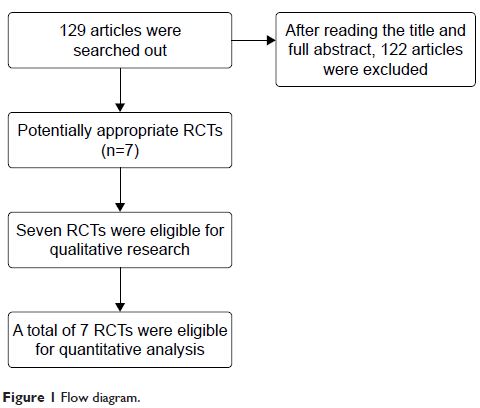109568
论文已发表
注册即可获取德孚的最新动态
IF 收录期刊
- 3.4 Breast Cancer (Dove Med Press)
- 3.2 Clin Epidemiol
- 2.6 Cancer Manag Res
- 2.9 Infect Drug Resist
- 3.7 Clin Interv Aging
- 5.1 Drug Des Dev Ther
- 3.1 Int J Chronic Obstr
- 6.6 Int J Nanomed
- 2.6 Int J Women's Health
- 2.9 Neuropsych Dis Treat
- 2.8 OncoTargets Ther
- 2.0 Patient Prefer Adher
- 2.2 Ther Clin Risk Manag
- 2.5 J Pain Res
- 3.0 Diabet Metab Synd Ob
- 3.2 Psychol Res Behav Ma
- 3.4 Nat Sci Sleep
- 1.8 Pharmgenomics Pers Med
- 2.0 Risk Manag Healthc Policy
- 4.1 J Inflamm Res
- 2.0 Int J Gen Med
- 3.4 J Hepatocell Carcinoma
- 3.0 J Asthma Allergy
- 2.2 Clin Cosmet Investig Dermatol
- 2.4 J Multidiscip Healthc

右美托咪定 (Dexmedetomidine) 在预防依托咪酯 (etomidate) 诱导的肌阵挛中的作用:一项综合分析
Authors Du X, Zhou C, Pan L, Li C
Received 9 September 2016
Accepted for publication 5 January 2017
Published 8 February 2017 Volume 2017:11 Pages 365—370
DOI https://doi.org/10.2147/DDDT.S121979
Checked for plagiarism Yes
Review by Single-blind
Peer reviewers approved by Dr Akshita Wason
Peer reviewer comments 2
Editor who approved publication: Dr Tuo Deng
Objective: To investigate the effect of dexmedetomidine in the prevention of
etomidate-induced myoclonus.
Methods: We searched for randomized controlled trials (RCTs)
regarding the use of dexmedetomidine in preventing etomidate-induced myoclonus
in the databases PubMed, EMBASE, the Cochrane Library, and CNKI. We extracted
data and assessed the quality of the literature and adopted RevMan 5.2 to
conduct meta-analysis on each effective index and employed funnel plot to test
publication bias.
Results: The results showed that the incidence of
etomidate-induced myoclonus in the dexmedetomidine treated groups was
significantly lower than that of the control groups (risk ratio [RR]=0.27, 95%
confidence interval [CI] [0.15, 0.47], P <0.00001). With regard to the
severity of etomidate-induced myoclonus, incidences of etomidate-induced
myoclonus in the dexmedetomidine treated groups resulting in mild myoclonus
(RR=0.37, 95% CI [0.19, 0.75], P =0.006), moderate myoclonus
(RR=0.21, 95% CI [0.12, 0.37], P <0.00001), or severe myoclonus
(RR=0.18, 95% CI [0.08, 0.38], P <0.00001) were significantly
lower than those of the control groups. No statistically significant difference
was found (RR=0.70, 95% CI [0.47, 1.04], P =0.08) between etomidate-induced
myoclonus in the dexmedetomidine treated groups and that of the midazolam
treated groups.
Conclusion: Dexmedetomidine can effectively prevent the incidence
of etomidate-induced myoclonus and reduce the severity of etomidate-induced
myoclonus. In addition, there were no significant differences between the
effects of dexmedetomidine and midazolam in preventing etomidate-induced
myoclonus.
Keywords: dexmedetomidine, myoclonus-chemically
induced, etomidate, meta-analysis
